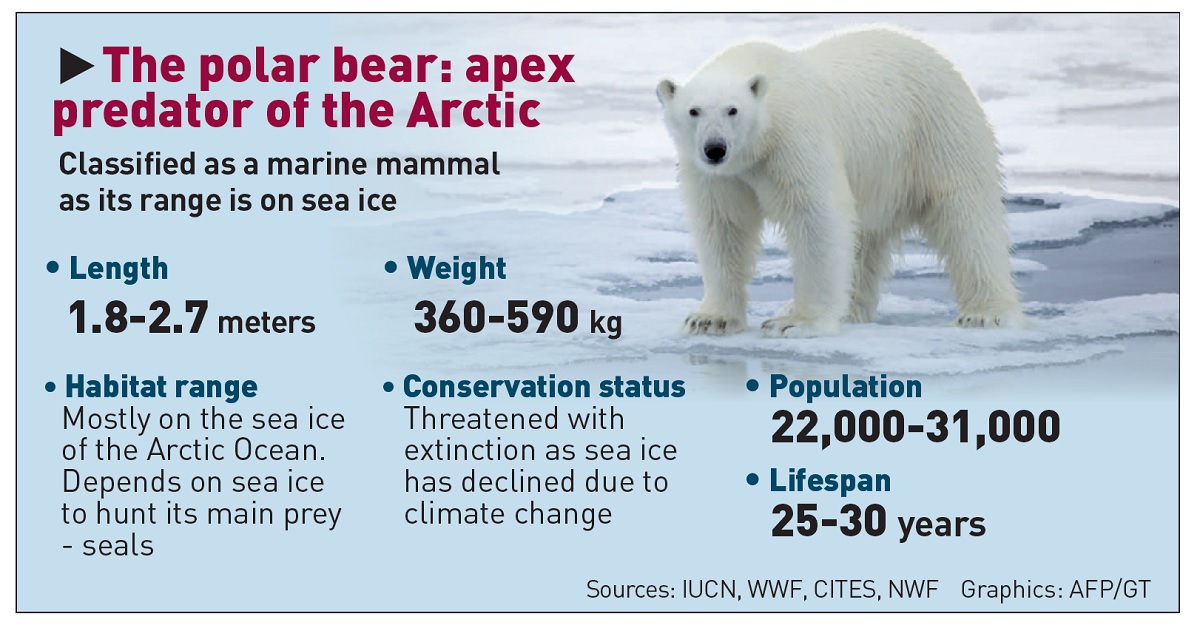Climate change on track to wipe out polar bears within 80 years: research
Source: AFP Published: 2020/7/21 18:48:40
Climate change is starving polar bears into extinction, according to research published on Monday that predicts the apex carnivores could all but disappear within the span of a human lifetime.

In some regions they are already caught in a vicious downward spiral, with shrinking sea ice cutting short the time bears have for hunting seals, scientists reported in Nature Climate Change.
Their dwindling body weight undermines their chances of surviving Arctic winters without food, the scientists added.
"The bears face an ever longer fasting period before the ice refreezes and they can head back out to feed," Steven Amstrup, who conceived the study and is chief scientist of Polar Bears International, told AFP.
On current trends, the study concluded, polar bears in 12 of 13 subpopulations analyzed will have been decimated within 80 years by the galloping pace of change in the Arctic, which is warming twice as fast as the planet as a whole.
There is not enough data for six others to make a determination as to their fate.
"By 2100, recruitment" - new births - "will be severely compromised or impossible everywhere except perhaps in the Queen Elizabeth Island subpopulation," in Canada's Arctic Archipelago, said Amstrup.
That scenario foresees Earth's average surface temperature rising 3.3 C above the preindustrial benchmark.
One degree of warming so far has triggered a crescendo of heat waves, droughts and superstorms made more destructive by rising seas. But even if humanity were able to cap global warming at 2.4 C - about half-a-degree above Paris Agreement targets, but hugely ambitious all the same - it would probably only delay the polar bears' collapse.
"That is still way above anything polar bears have faced during 1 million years of evolutionary history," said Amstrup.
The threat is not rising temperatures per se but the top-of-the-food-chain predators' inability to adapt to a rapidly shifting environment.
"If somehow, by magic, sea ice could be maintained even as temperatures increase, polar bears might be fine," Amstrup said by email.
"The problem is that their habitat is literally melting."
Half of Earth's land-based megafauna are classified as threatened with extinction, but only polar bears are endangered primarily by climate change. But that status may not be unique for long, and should be seen as a harbinger of how climate will impact other animals in the coming decades, the authors warned.
There are approximately 25,000 Urus maritimus left in the wild today.
The new study is the first to put a timeline on their likely demise.
Newspaper headline: Clock ticking for Arctic creatures’ survival

In some regions they are already caught in a vicious downward spiral, with shrinking sea ice cutting short the time bears have for hunting seals, scientists reported in Nature Climate Change.
Their dwindling body weight undermines their chances of surviving Arctic winters without food, the scientists added.
"The bears face an ever longer fasting period before the ice refreezes and they can head back out to feed," Steven Amstrup, who conceived the study and is chief scientist of Polar Bears International, told AFP.
On current trends, the study concluded, polar bears in 12 of 13 subpopulations analyzed will have been decimated within 80 years by the galloping pace of change in the Arctic, which is warming twice as fast as the planet as a whole.
There is not enough data for six others to make a determination as to their fate.
"By 2100, recruitment" - new births - "will be severely compromised or impossible everywhere except perhaps in the Queen Elizabeth Island subpopulation," in Canada's Arctic Archipelago, said Amstrup.
That scenario foresees Earth's average surface temperature rising 3.3 C above the preindustrial benchmark.
One degree of warming so far has triggered a crescendo of heat waves, droughts and superstorms made more destructive by rising seas. But even if humanity were able to cap global warming at 2.4 C - about half-a-degree above Paris Agreement targets, but hugely ambitious all the same - it would probably only delay the polar bears' collapse.
"That is still way above anything polar bears have faced during 1 million years of evolutionary history," said Amstrup.
The threat is not rising temperatures per se but the top-of-the-food-chain predators' inability to adapt to a rapidly shifting environment.
"If somehow, by magic, sea ice could be maintained even as temperatures increase, polar bears might be fine," Amstrup said by email.
"The problem is that their habitat is literally melting."
Half of Earth's land-based megafauna are classified as threatened with extinction, but only polar bears are endangered primarily by climate change. But that status may not be unique for long, and should be seen as a harbinger of how climate will impact other animals in the coming decades, the authors warned.
There are approximately 25,000 Urus maritimus left in the wild today.
The new study is the first to put a timeline on their likely demise.
Newspaper headline: Clock ticking for Arctic creatures’ survival
Posted in: WORLD FOCUS,OTHER REGIONS